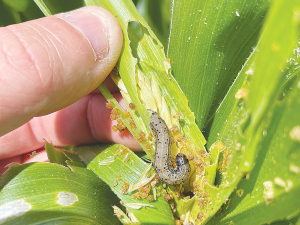Maize and sweetcorn pest fall armyworm has defied initial assessments regarding its ability to survive over winter in some parts of New Zealand.
First detected in March 2022, it has persisted in warmer parts of New Zealand ever since.
While its ability to overwinter in Northland was anticipated, consistent populations on the West Coast of the South Island have surprised researchers.
Lincoln AgResearch scientist Craig Phillips says that while fall armyworm (FAW) is a tropical species, it is surprisingly cold hardy.
“It is easy to forget that continental places like Florida and the southern United States can get much colder in winter than many parts of New Zealand. It is that intense cold in mid-winter, even in tropical areas, that kills FAW.”
In contrast, New Zealand has a temperate, oceanic climate. “So, it survives here fairly easily.”
Phillips told a May FAW research workshop, which brought together scientists working on a range of projects involving the pest, that an isotherm distribution model indicates FAW can overwinter where the mean annual temperature doesn’t drop below 10degC.
Modelling shows that the further south, and the further inland, the less likely FAW can survive year-round. As New Zealand gets warmer, FAW’s year-round distribution will move southwards, inland, and to higher altitude areas.
Anomalies include the Grey Valley and some other parts of Westland where FAW has been found regularly, despite modelling suggesting it shouldn’t survive year-round.
“It may be climate change and unmeasured microclimates as we have few New Zealand records of FAW during winter.”
Lincoln AgResearch scientist Scott Hardwick says that over the last three years there have been consistent populations of FAW in Westland throughout the growing season.
“There is definitely overwintering there; either that or there is a constant flow into that region and I don’t think that is the case.
"However, as it is not as warm as more northern regions, larvae are not growing as quickly, only getting to two generations over the growing season, with potentially a third generation lasting over winter."
Tasman is also an interesting case, with moderate infestations throughout the growing season. Infestation of FAW starts early in the season and is ongoing. The region grows a limited amount of sweetcorn, along with maize for the dairy platform and for grain.
In Northland in the 2024-25 season, FAW likely reached four generations, the most since it was first detected. As well as early season FAW damage to young sweetcorn and maize crops, requiring replanting in some cases, late finishing grain crops were also impacted.
In Auckland, Waikato, Bay of Plenty and Taranaki there were few reports of crops being impacted. Gisborne recorded significant damage to late finishing sweetcorn.
More research is needed on FAW’s dispersal and on its overwintering hosts, Hardwick says.
As there is little or no maize or sweetcorn during winter in most parts of New Zealand, apart from volunteer plants, FAW may feed on other C4 grasses but has a wide host range.
On the West Coast, some farmers are growing fodder maize over winter; high densities of maize which are grazed while still a young plant. This is likely to assist with overwintering of FAW, Scott Hardwick says.
FAR biosecurity officer Ash Mills says volunteer maize and sweetcorn plants hosting FAW larvae are being observed across New Zealand. These plants could act as a “green bridge” and support a FAW population through the cooler season into the next growing period in spring.
“Keep being observant. Please reach out with any FAW reports and speak with your local advisor if you need any assistance,” he says.


















